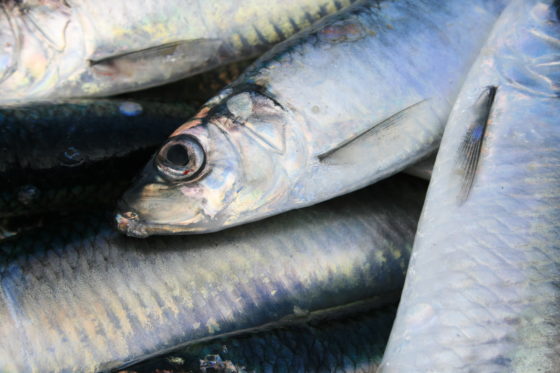
Stockholm, 8 November, 2023: FishSec is happy to announce that our new project Small Fish – Big Impact has started. This project, generously funded by the Swedish Postcode Lottery, will focus on the small but important fish known as forage fish, the importance of these species in the Baltic Sea and the need to manage these fish through an ecosystem based approach.
Forage fish like sprat and herring are very important for the marine ecosystem, serving as a food source for larger predators including cod and salmon, marine mammals and seabirds. They are also culturally and economically important in many countries, and are among the most lucrative fisheries in the Baltic Sea. Scientific data now shows that both the central Baltic Sea herring and the Bothnian herring are in a critical state. Similarly, both Baltic Sea cod stocks are on the verge of collapse with a shortage of food one of the key drivers of their decline. It is clear that urgent action is needed to save the Baltic Sea ecosystem.
Considering the poor situation for Baltic Sea herring, our new project Small Fish – Big Impact is especially timely. This project will focus on the importance of these species in the Baltic Sea and the need to manage them through an ecosystem-based approach (EBM). Even though EU fisheries ministers agreed in 2013 to include EBM when deciding how much fish can be legally caught they continue to set fishing quota to high putting on short term profit above long term ecosystem health. On 23-24 of October, EU fisheries ministers decided that in 2024 targeted fisheries for herring will continue, despite the poor state of several stocks (read more in our joint NGO reactive) and scientists advising to close the fishery. For sprat they continued to set the quota at such a high level that there will not be enough fish in the system for cod and other predators to feed on.
Sara Söderström, Policy Officer for The Fisheries Secretariat, said: “We are highly disappointed that the Baltic fisheries ministers ignored both sound scientific advice and even the law. In the past years we saw some hopeful signs of a changing narrative placing ecosystem considerations closer to decision-making, but it seems we are back to business as usual.”
The Small fish, Big impact project consists of three main sections; a scientific report that describes the best available information on forage fish in the Baltic, the fisheries and the impact of fisheries management decisions. The recommendations from the report will be used in an outreach and advocacy campaign to improve the management of forage fish. To do this we will build a collaborative NGO network both within the Baltic and around Europe.
Through this project we aim to establish long-term change through a reduced fishing pressure on small pelagic fish due to the recognition of the importance of forage fish in the ecosystem. This will be of great importance to both societies and the environment.
“Small pelagic fish play a crucial role in the Baltic Sea ecosystem and are an important food source for marine mammals, birds and predatory fish. Today, a large amount is caught and used as animal feed, which creates an imbalance and lack of food. Therefore, it is vital to provide decision-makers with a clear scientific basis to make the decisions necessary to help small pelagic fish recover. This benefits the ecosystem, sustainable fishing and people around the Baltic Sea. We are proud to support FishSec who strive to achieve this!”, says Marie Dahllöf, Secretary General of the Swedish Postcode Foundation.
Small fish Big impact is financed by the Swedish Postcode Foundation and co-financed by the Swedish Agency for Marine and Water Management.